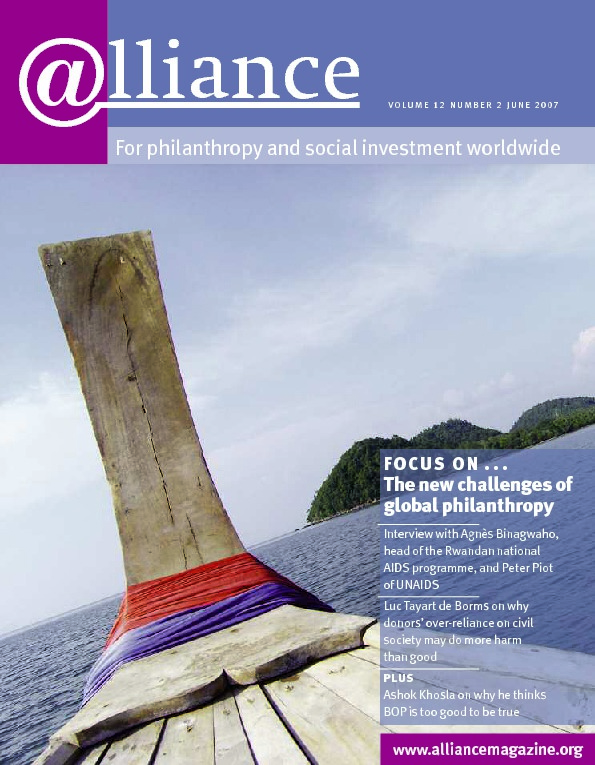In February 2006, a total of 40 participants comprising members of the EFC-COF Joint Working Group, foundations, grantees and partners from throughout Africa came together in Cape Town to discuss the draft principles proposed by the Working Group. The Working Group’s decision to hold a consultative meeting to listen to and learn from foundations working in Africa and from African partners and grantees itself serves as an important model of accountability in international philanthropy.
To kickstart the process, participants were asked to engage in a hypothetical exercise in which the usual power relations between grantmakers and grantees were reversed, with grantees having the ability to dictate, through the medium of ‘letters’, the basis on which they would be prepared to accept funding. The resulting ‘letters’ are very powerful in conveying key concerns about the nature of the relationships between grantmakers and grantees, both the principles underlying these relationships and the more practical aspects. One letter also emphasized that these relationships have limits, ending with the injunction: ‘Remember it’s not personal – we don’t have to like each other to work well together.’
Two of these letters appear on this page and provide an indication of the value of the resulting dialogue, which culminated in a sense of ownership of the process and of the report to the Working Group. The final report on which this article is based was approved by participants subsequent to the meeting, and they also agreed that the letters could be made public.
Space constraints preclude a detailed discussion of participants’ rich and nuanced feedback to the Working Group, which included 22 specific points relating primarily to international funders’ downward accountability and ideal forms of partnering relationships. Participants noted that while many good relationships have been formed between funders and their NGO counterparts, some of the most important lessons have been learned from experiences that have not been particularly positive.
Participants also observed that the level of trust required to discuss accountability issues openly has yet to develop and acknowledged that NGOs themselves have much work to do in this regard. Perhaps the most fundamentally challenging question concerning accountability that emerged is ‘How do we create structures that enable us to engage on an ongoing basis with each other and interact with donors?’
Letter 1: What we consider important in our work with foundations:
- Transparency – a clear understanding of what their motives/interests/values are in supporting our work. An openness regarding the issues that affect/dictate the manner in which they support us, eg legal and policy constraints in their countries.
- A willingness to learn – the kind that looks at the relationship as a growing experience that enriches the mutual goals of both grantor and grantees.
- A willingness to experiment and take risks – to go down uncharted/unfamiliar roads that have potential to maximize the impact of or benefit from grants.
- The courage to face and clearly identify the role of power dynamics in shaping not only donor-donee relationships but also donor and government or other stakeholder relationships. The fact that we are still at this point asking WHY not much has changed is probably because we pretend that these relationships can be neutral.
- A willingness to use feedback from the grantee to improve what has been for the foundation a ‘tried-and-tested’ way of doing things and to convene forums with other foundations to share the learning.
Letter 2: If I am to receive funding from your organization I would like you to consider the following:
- Funding must not be project specific but flexible enough to allow expenditure on: salaries, capacity building, staff training, core costs, eg administration. It should also be recognized that plans can change.
- Reporting criteria must be specified, not too onerous, tie in with financial year and ideally complement that of existing donors.
- Project visits must be carried out so that you can familiarize yourself with the actual workings of my organization.
- Facilitation of meetings with other organizations working in a similar sector to ourselves and funded by you should be organized.
- Your exit strategy must be clarified upfront.
- There should be a formal contract to which we are both accountable.
- You must listen to and take advice from us as experts in our field and with relevant local knowledge on the ground.
- There must be regular communication, and if problems arise they should be treated fairly. We should feel able to share our concerns with you.
Ceri Oliver-Evans is Director, Southern Africa-United States Centre for Leadership and Public Values, University of Cape Town. Email cerioliv@gsb.uct.ac.za



Comments (0)